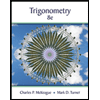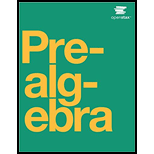
EBK MATHEMATICS FOR MACHINE TECHNOLOGY
7th Edition
ISBN: 9780100548169
Author: SMITH
Publisher: YUZU
expand_more
expand_more
format_list_bulleted
Textbook Question
thumb_up100%
Chapter 51, Problem 28A
Determine the answers to the following exercises which are based on corresponding parts.
Refer to triangle EEG.
a. Find the shortest side.
b. Find the next shortest side.
c. Find the longest side.

Expert Solution & Answer
Trending nowThis is a popular solution!

Students have asked these similar questions
arc.
Consider the network of Figure 2, where the capacities of arcs are given in rectangles at each
(i) Knowing that (W, W) with W =
network.
{s, a, b, c} is a minimal s- t cut suggest a maximal flow for this
Consider the problem of minimising the Euclidean distance from the point (-4,5) in the plane to the set
of points (x, y) that have integer coordinates and satisfy the inequality:
x2
y²
+ ≤1.
4 9
(a) Use an exhaustive search to solve this problem.
(b) Use a local search method to solve this problem. First, define the search space and the neighbourhood.
Then, attempt to find the minimum starting from the initial point
(x, y) = (2,0).
The neighbourhood of a point should contain at least two distinct points but must not encompass
the entire feasible search space. Will your local search method find the global optimum?
Consider the relation ✓ on R² defined by
u ≤ v
u₁ + v₂+ 3u1 v² < u₂ + v³ + 3u²v₁
(u³ + v2 + 3u1v = u₂+ v³ + 3u²v₁ and u₂ < v2)
u = v
for any u, vЄR² with u = = (u1, u2), v = = (V1, V2).
or
우우
or
1. Prove that the relation ✓ is translation invariant. Hint: Use the formula of (a + b)³ for a, b = R.
2. Is the relation ✓ scale invariant? Justify your answer.
3. Is the relation ✓ reflexive? Justify your answer.
4. Is the relation ✓ transitive? Justify your answer.
5. Is the relation ✓ antisymmetric? Justify your answer.
6. Is the relation ✓ total? Justify your answer.
7. Is the relation ✓ continuous at zero? Justify your answer.
Chapter 51 Solutions
EBK MATHEMATICS FOR MACHINE TECHNOLOGY
Ch. 51 - Determine the values of 2, 3, and 4 if l is 113.Ch. 51 - Use a protractor to measure the angle to the...Ch. 51 - Express 191.5326 as degrees, minutes, and seconds....Ch. 51 - Cast iron 10 cm in diameter is turned in a lathe...Ch. 51 - Solve 4t7t2216=12t.Ch. 51 - If m m=5,p=2,and r=12 ,find m24p+3rmp+prmmr.Give...Ch. 51 - Identify each of the triangles 7 through 14 as...Ch. 51 - Identify each of the triangles 7 through 14 as...Ch. 51 - Identify each of the triangles 7 through 14 as...Ch. 51 - Identify each of the triangles 7 through 14 as...
Ch. 51 - Identify each of the triangles 7 through 14 as...Ch. 51 - Identify each of the triangles 7 through 14 as...Ch. 51 - Identify each of the triangles 7 through 14 as...Ch. 51 - Identify each of the triangles 7 through 14 as...Ch. 51 - Solve the following exercises: Find the value of...Ch. 51 - Solve the following exercises: Find the value of...Ch. 51 - Solve the following exercises: Find the value of...Ch. 51 - Solve the following exercises: Find the value of...Ch. 51 - Solve the following exercises: In triangle ABC, BC...Ch. 51 - Solve the following exercises: In triangle EFG,...Ch. 51 - Solve the following exercises: Find the value of...Ch. 51 - Solve the following exercises: All dimensions are...Ch. 51 - Solve the following exercises: Find the value of...Ch. 51 - Solve the following exercises: Hole centrelines...Ch. 51 - Solve the following exercises: Find the value of...Ch. 51 - Solve the following exercises: ABDE,BC is an...Ch. 51 - Determine the answers to the following exercises...Ch. 51 - Determine the answers to the following exercises...Ch. 51 - Determine the answers to the following exercises...Ch. 51 - Determine the answers to the following exercises...
Knowledge Booster
Learn more about
Need a deep-dive on the concept behind this application? Look no further. Learn more about this topic, advanced-math and related others by exploring similar questions and additional content below.Similar questions
- Let X = [−1, 1] C R and consider the functions ₤1, f2 : X → R to be minimised, where f₁(x) = x + x² and f2(x) = x-x² for all x Є X. Solve the tradeoff model minøx µƒ₁(x)+ƒ2(x), for all values of µ ≥ 0. Show your working.arrow_forwardConsider the following linear programming problem: min x1 x2 3x3 − x4 s.t. — 2x1 − x2 − x4 ≤ −6 x1 x2 x3 + 2x4 <4 x1, x2, x3, x4 ≥ 0. (i) Write an equivalent formulation of this problem, to which the primal-dual algorithm can be applied. (ii) Write out the dual problem to the problem, which you formulated in (i). (iii) Solve the problem, which you formulated in (i), by the primal-dual algorithm using the dual feasible solution π = (0, -3). Write a full record of each iteration.arrow_forward୮ dx L1+zadz 1+x2arrow_forward
- Consider the following Boolean Satisfiability problem: X2 F (X1, X2, X3, X4, x5) = (x1 √ √ ¤;) ^ (ס \/ ˜2\/×3)^(×k \/×4 \/ ×5) ^^\ (×1\/15), Є where i Є {2, 3, 4, 5}, j = {1, 4, 5}, k = {1, 2, 3} and l € {1, 2, 3, 4}. xk Can this problem be solved by using the Divide and Conquer method?arrow_forwardnot use ai pleasearrow_forwardL(x²²)dx x4 find the value of 4 the integral using the simpson method an error not exceeding 10 -2 1 with 3arrow_forward
arrow_back_ios
SEE MORE QUESTIONS
arrow_forward_ios
Recommended textbooks for you
 Trigonometry (MindTap Course List)TrigonometryISBN:9781337278461Author:Ron LarsonPublisher:Cengage Learning
Trigonometry (MindTap Course List)TrigonometryISBN:9781337278461Author:Ron LarsonPublisher:Cengage Learning Trigonometry (MindTap Course List)TrigonometryISBN:9781305652224Author:Charles P. McKeague, Mark D. TurnerPublisher:Cengage Learning
Trigonometry (MindTap Course List)TrigonometryISBN:9781305652224Author:Charles P. McKeague, Mark D. TurnerPublisher:Cengage Learning Elementary Geometry For College Students, 7eGeometryISBN:9781337614085Author:Alexander, Daniel C.; Koeberlein, Geralyn M.Publisher:Cengage,
Elementary Geometry For College Students, 7eGeometryISBN:9781337614085Author:Alexander, Daniel C.; Koeberlein, Geralyn M.Publisher:Cengage, Holt Mcdougal Larson Pre-algebra: Student Edition...AlgebraISBN:9780547587776Author:HOLT MCDOUGALPublisher:HOLT MCDOUGAL
Holt Mcdougal Larson Pre-algebra: Student Edition...AlgebraISBN:9780547587776Author:HOLT MCDOUGALPublisher:HOLT MCDOUGAL
 Elementary AlgebraAlgebraISBN:9780998625713Author:Lynn Marecek, MaryAnne Anthony-SmithPublisher:OpenStax - Rice University
Elementary AlgebraAlgebraISBN:9780998625713Author:Lynn Marecek, MaryAnne Anthony-SmithPublisher:OpenStax - Rice University

Trigonometry (MindTap Course List)
Trigonometry
ISBN:9781337278461
Author:Ron Larson
Publisher:Cengage Learning

Trigonometry (MindTap Course List)
Trigonometry
ISBN:9781305652224
Author:Charles P. McKeague, Mark D. Turner
Publisher:Cengage Learning

Elementary Geometry For College Students, 7e
Geometry
ISBN:9781337614085
Author:Alexander, Daniel C.; Koeberlein, Geralyn M.
Publisher:Cengage,

Holt Mcdougal Larson Pre-algebra: Student Edition...
Algebra
ISBN:9780547587776
Author:HOLT MCDOUGAL
Publisher:HOLT MCDOUGAL


Elementary Algebra
Algebra
ISBN:9780998625713
Author:Lynn Marecek, MaryAnne Anthony-Smith
Publisher:OpenStax - Rice University
What are the Different Types of Triangles? | Don't Memorise; Author: Don't Memorise;https://www.youtube.com/watch?v=1k0G-Y41jRA;License: Standard YouTube License, CC-BY
Law of Sines AAS, ASA, SSA Ambiguous Case; Author: Mario's Math Tutoring;https://www.youtube.com/watch?v=FPVGb-yWj3s;License: Standard YouTube License, CC-BY
Introduction to Statistics..What are they? And, How Do I Know Which One to Choose?; Author: The Doctoral Journey;https://www.youtube.com/watch?v=HpyRybBEDQ0;License: Standard YouTube License, CC-BY
Triangles | Mathematics Grade 5 | Periwinkle; Author: Periwinkle;https://www.youtube.com/watch?v=zneP1Q7IjgQ;License: Standard YouTube License, CC-BY
What Are Descriptive Statistics And Inferential Statistics?; Author: Amour Learning;https://www.youtube.com/watch?v=MUyUaouisZE;License: Standard Youtube License